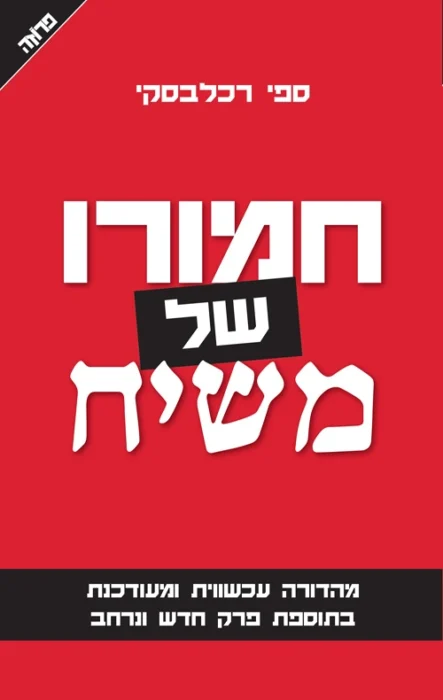Please scroll down for an English review.
אם אתם מסתובבים במדינה בשנים האחרונות בתחושה שאתם לא מבינים מה קורה פה, חמורו של משיח יסביר לכם בדיוק את מה שלא הצלחתם להבין.
זהו ספר חשוב, מגובה בציטוטים, עובדות ובאזכורים היסטוריים. הוא משרטט קו ברור בין רצח רבין למהפכה המשפטית־דתית שמתרחשת בעודי כותבת את הסקירה הזו. הספר מציג את התהליכים המתרחשים בחברה הישראלית כתהליכים ממאירים, שמקורם בציבור שהוביל לרצח רבין, ואשר מאז חתר בהצלחה לעמדות מפתח שלטוניות. הוא מתאר את המהלך כאידיאולוגיה סדורה, שיטתית ועקבית, שמבקשת לשנות את זהותה של המדינה מן היסוד.
החוט המקשר בין כל אלה הוא רעיון תיאולוגי־פוליטי: חמורו של משיח. בהתאם לתפיסה הדתית, הציבור החילוני שהקים את המדינה, לחם את מלחמות הקיום שלה והניח את יסודותיה האזרחיים, איננו אלא כלי. תפקידו הסתיים. הגאולה, לפי השקפה זו, תגיע רק כאשר ישראל תהפוך למדינת הלכה. ולפיכך, כל האמצעים כשרים.
רכלבסקי עוקב אחר האופן שבו רעיונות משיחיים, שעד לא מזמן נדחקו לשולי השיח, הופכים לכוח מרכזי שמעצב מדיניות, תודעה ונורמות שלטוניות. לא מדובר רק בדת, אלא בתפיסת עולם שלמה שמכופפת את הדמוקרטיה לצורכי הגאולה.
זהו ספר שאינו עוסק רק בעבר. הוא נוגע בכאן ובעכשיו: בזחילה הסמויה לעבר מדינת הלכה, בהקצנת הזהות הקולקטיבית ובהשתקה המכוונת של כל ערך נאור. רכלבסקי אינו מערפל את המסר. הוא חד, ישיר ולעיתים חריף. בתוך המציאות הנוכחית, הקריאה בספר מלווה ברגשות קשים ומתסכלים.
המהדורה המחודשת כוללת מבוא חדש, מותאם לרוח הזמן, שבו נסקרים עיקרי הטיעון כבר בתחילת הספר. זו בחירה שיש לה מחיר: ההפתעות נעלמות, והעיקר מונח כבר בפתח. ובכל זאת, הפרקים שבאים אחר כך מעמיקים, מחדדים ומרחיבים את התמונה. המשקל האינטלקטואלי והאזרחי של הספר נשמר.
יובל נח הררי עסק בנושאים דומים בספרו מחשבות על המאה ה־21, אך בעוד שהררי שומר על טון מופשט ומרחף, רכלבסקי כותב כאן ספר חי ובועט, שמדבר בגובה העיניים. זהו ספר שמלא תשוקה, עמדת מחאה ואמונה עמוקה בזכותה של חברה דמוקרטית להגן על עצמה.
למי שמבקש להבין את העימות בין ישראל האזרחית לישראל המשיחית, את הסכנה שבהיעדר הפרדה בין דת למדינה, ואת האיום המובנה על הדמוקרטיה מצד אלו שטוענים לדבר בשם האל, חמורו של משיח הוא קריאת חובה.
המסקנה, לקורא הליברלי חפץ־החיים והנאור, ברורה: יש להבהיר מחדש את יחסי הדת והמדינה, לא כרעיון פילוסופי אלא כחזון אזרחי תקיף. אין סיבה שיהדות תהיה שם נרדף לדת. יש יהודים מאמינים, ויש יהודים חילונים. ליהדות יש גם זהות לאומית, אזרחית והיסטורית שאינה תלויה באמונה באל. אם לא ניצור את ההבחנה הזו כעת, אין סיבה להניח שנוכל לשרוד כחברה חופשית ושפויה. אם לא נפריד עכשיו, נהפוך לשכנותינו: מדינות דת קנאיות, מסוכסכות עם עצמן ועם סביבתן.
חמורו של משיח/ ספי רכלבסקי
הוצאת ידיעות ספרים, 2023, 530 עמ'
דירוג SIVI –
איכות אודיו –

If you've been walking around Israel recently feeling confused about current events, this book will clarify what you've been missing.
The Messiah’s Donkey is a powerful and urgent analysis of the processes reshaping Israeli society from within. Grounded in historical references and well-researched facts, Sefi Rachlevsky draws a clear line: from the assassination of Yitzhak Rabin to the religious, judicial revolution taking place at the very moment of writing. He presents these shifts as malignant, deliberate, and deeply ideological, led by the very same public that encouraged Rabin’s assassination and has since succeeded in ascending to the highest levels of power.
At the heart of it, all lies a theological-political concept: the Messiah’s Donkey. According to this doctrine, secular Israelis – who built the state, fought its wars, and laid its civic foundations – are merely a tool. Their historical role has ended. Proper redemption will come only once Israel is transformed into a theocratic state. And for that purpose, any means are justified.
Rachlevsky meticulously traces how messianic ideas, once marginal and extreme, have become central forces shaping public policy, collective identity, and social norms. This isn’t just about religion – it’s about an entire worldview seeking to bend democracy to the service of divine destiny.
This book is not a look at the past. It speaks directly to the present: to the silent drift toward a halakhic state, to the radicalization of national identity, and the suppression of liberal values. Rachlevsky does not soften his message. His tone is sharp, direct, and at times uncompromising. Within today’s political reality, reading this book is an emotional, sometimes infuriating, experience.
The updated edition includes a new preface tailored to the current crisis. It lays out the core argument from the very start – a structural choice that may reduce the element of surprise but does not diminish the force of the book’s later chapters. If anything, it strengthens them.
Yuval Noah Harari also addresses these themes in "21 Lessons for the 21st Century." Still, where Harari offers abstract contemplation, Rachlevsky gives us a book that breathes, burns, and speaks in plain language. It is passionate, urgent, and anchored in the political and social tremors of the present.
For readers seeking to understand the collision between civil and messianic Israel, the danger of blurred lines between religion and state, and the systemic threat posed by those who claim to speak in God's name, The Messiah’s Donkey is essential reading.
The conclusion, for the liberal, life-loving, and enlightened reader, is clear: we must redefine the relationship between religion and state, not as a vague idea but as a concrete civic vision. There is no reason why Jewish identity must be synonymous with religion. There are Jews who believe in God and Jews who do not. Jewishness is also a national, historical, and civic identity that stands on its own. Without making this distinction now, we will not survive as a free and rational society. If we fail to act, we will become like our neighbors: theocratic, intolerant, and at war with ourselves.
לגלות עוד מהאתר Sivi's Books
Subscribe to get the latest posts sent to your email.

